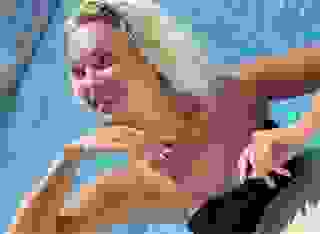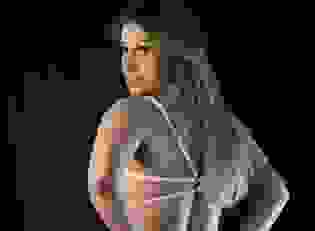Note: You can change font size, font face, and turn on dark mode by clicking the "A" icon tab in the Story Info Box.
You can temporarily switch back to a Classic Literotica® experience during our ongoing public Beta testing. Please consider leaving feedback on issues you experience or suggest improvements.
Click hereBecause of the looks from the people, the walk seemed to be a mile long to Bird, but finally, he stepped up on the wood walk in front of the building that said "MARSHALL" on the door. After taking a deep breath, Bird opened the door and stepped inside. The man sitting at the desk looked up and smiled.
"Morning. I'm Marshall Dunbar. What can I do for you?"
Bird cleared his throat, more to have a little time to think than anything else. He'd been over what he was going to say a hundred times before he fell asleep, and another hundred since he woke. Now, suddenly, he didn't know where to start so he said the first thing that popped into his mind.
"The ...the stage wrangler said I should come talk to you."
"Oh...and why would he say that? I don't think I know you."
"No, Marshall, you don't. The reason is I'm a blacksmith and this town needs one. I'd like to stay here and be that blacksmith. The wrangler said I'd need to talk to you first so you'd know I wasn't going to cause any trouble."
The man smiled again, laced his fingers together, and placed them on the desk in front of him.
"Well, it's true that we don't want troublemakers in town, but you don't look like that sort to me. Where do you call home and what brought you to Bright Star?"
Bird was silent for a few seconds, a few seconds he used to decide if he should tell the truth or tell the story he'd told the wrangler.
Bird looked at the man behind the Marshall's desk. The man was still smiling, but Bird could almost see the thoughts running through the man's mind. It was his eyes. The man's eyes never strayed from their gaze into his own. It was as if the man was trying to read Bird's mind. The man would likely know if he lied, so Bird told the truth.
"Marshall, I grew up in Grits, in the Oklahoma Territory."
"Grits...that's just north of here a few days ride. That'd make you Choctaw then?"
"Well, part Choctaw, but my mother was Cherokee. My grandfather was Scottish. I guess I'm a half-breed like the wrangler said."
The Marshall leaned forward in his chair.
"I know a little about the Cherokee. Not much about the Choctaw, though I served with some in the war. The ones I've met seem like good people. Why didn't you stay there?"
Bird thought again for a few seconds. The Marshall seemed like a pleasant sort of man, but those eyes were still staring into his own, piercing them all the way to his soul. Would he really understand?
Bird took a deep breath.
"Marshall, I'll tell you the truth, but I'd appreciate it if you didn't spread it around...that is if you'll let me stay."
The Marshall unlaced his fingers, leaned back, and pointed to the chair in front of his desk.
"Sounds like this might take a while. Have a seat."
Bird sat down and then related the story of Nanyehi and her mother's failed attempt to control the young girl. His voice faltered a little when he told of her death, and then became cold and harsh when he told of his banishment.
The Marshall had nodded as Bird spoke, and now leaned forward again.
"So, you just came to Bright Star because there was nowhere else to go?"
Bird smiled.
"Yes, that's about the size of it."
"And you really are a blacksmith?"
"Yes, sir. If you don't believe me, you can ask the stage wrangler. I fixed the shoe on one of his horses yesterday."
The Marshall leaned back in his chair again.
"You know some people here might not like their blacksmith to be an Indian. There are former Union soldiers in Bright Star. Some of them fought Indians in the war. How will you handle that?"
"I didn't fight in the war, and I'll tell people that if they ask. The wrangler said Bright Star is a town of people who work hard and help each other out. I'll work just as hard, and I'll help people whenever I can, however I can. If that doesn't work, I'll just leave. I don't want to cause trouble for anybody. I've seen enough trouble to last me a lifetime already."
The Marshall stood up and offered Bird his hand.
"My name is Enos, Enos Dunbar. What's your name?"
"Bird."
"Bird...that's all?"
"Just Bird."
Well Bird, I believe your story, and we do need a blacksmith. I'll have a talk with Mayor Johnson about you, but I wouldn't worry too much. The Mayor's pretty accepting of people.
"You should probably go talk to Clayton's widow. She inherited the shop and everything in it when Clayton was killed. She'll likely want you to pay her for it. You have any money?"
Bird frowned.
"Not enough to buy a whole blacksmith shop. I couldn't even buy the anvil with the money I have."
"Well, there's always the bank, but I never liked borrowing something and especially not money. I'd bet you can work out something with Hester so you pay her a little every week or so."
When Bird left the Marshall's office, he was full of hopes and more than a little fearful about talking with the widow of the former blacksmith. He was also feeling the frowns on the faces of the people on the streets. He hoped the widow of the blacksmith would listen to him instead of just slamming the door in his face.
}{
Before Katherine sent to see the mayor of Bright Star, she brushed her red hair until it shined, and then put on her best dress. She walked downstairs to the dining room for breakfast, but found she was too nervous to eat much. Instead, she ordered just a cup of coffee and two pieces of toast. After finishing her toast, she gathered her courage, went to the desk, and asked the clerk if the mayor had arrived yet. He directed her to come behind the desk and then to the door on the left.
When Mayor Johnson answered her knock, he smiled.
"Esau said I'd have a visitor this morning. He didn't say you'd be such a pretty woman. He also didn't tell me your name. What is it?"
"Abigail, Sir, Abigail O'Gracy."
"Well, Abigail, come in and have a seat. He says you asked him if Bright Star had a school."
Katherine took a deep breath.
"Yes, Sir, I did ask him that because I wondered if you would hire me to teach school."
Mayor Johnson smiled again.
"We don't have a school, but the townspeople would like to have one. Bright Star is on the stage route and if what I hear is right, we'll soon be at least close to a railroad. That means our businesses will grow and we need educated people to make that happen.
"Now, what can you tell me about yourself that will tell me you'd be a good school teacher? Ever taught school before?"
Katherine shook her head.
"No, Sir, I haven't taught in a regular school, but I assisted the children of my employer in the learning of their studies and I listened to the teacher when he had their classes."
Mayor Johnson raised his eyebrows.
"Oh, where was that?"
Mayor Johnson was digging deeper into Katherine's past than she'd anticipated and she felt her courage failing.
"In New York City, Sir. I worked as a nanny and housekeeper there."
"I see. With the last name of O'Grady and that red hair, you must be Irish. Were you born in New York City?"
"No, Sir. I was born in Ireland and came to America on a ship about a year ago."
Mayor Johnson frowned then.
New York City is a long way from Bright Star, Texas. How'd you get here?"
Katherine knew she couldn't tell Mayor Johnson he truth. If she did, he'd probably take her to the Marshall. She'd have to lie. She hoped she could make the lie at least plausible.
"My employer worked for a man who built railroads and he had business to do in Little Rock, Arkansas. He decided to take his family with him, so I went along to watch the children. When we got to Little Rock, Arkansas I heard people say Texas was a place where people didn't care who you were as long as you worked hard. I told my employer I was resigning and then bought passage on the stagecoach to Dallas. When the stagecoach stopped in Bright Star, it looked like a nice town so I decided I'd see if I could find work here."
Mayor Johnson didn't believe most of what this O'Grady woman had told him, but a lot of people came West to seek better fortunes than they'd had in the East.
"Well, Abigail, if I might call you by your first name, it would take a brave woman to ride that stage from Little Rock to Bright Star, but I suppose it takes a brave woman to be Irish in New York City. From what I've heard, the Irish are treated little better than the black slaves were treated in the South."
Katherine smiled.
"The family I worked for were nice to me, Sir, so I wouldn't know about that."
Mayor Johnson smiled again.
"Being Irish also means you're a Catholic, doesn't it?"
"Yes, Sir, I am."
Mayor Johnson's smile turned into a flat line.
"Folks here in Bright Star are mostly Baptist with a few Methodists thrown in. Wouldn't do to have a school teacher trying to convert their boys and girls."
Katherine didn't have to lie about that.
"Sir, in Ireland, there was a lot of hatred between Catholics and Protestants. I saw that and it didn't help either side. That's one of the reasons I wanted to come to America. I read that in America you can be any religion you want. I can't teach any child to be a Catholic because I'm not a nun. I'm just a normal woman who wants to start a school here in Bright Star."
Mayor Johnson smiled again.
"Well we do need a school, but we don't have a school building yet. Until we can get one built, where would you teach?"
Katherine had an answer for that from her own personal experience.
"Sir, a school building would be nice, but I don't need a building to start. In Ireland, I went to a hedge school that was held in a barn and sometimes outside if the weather was nice. All I need is a place big enough for all the students and some benches."
Mayor Johnson was thinking. For the last two years, Bright Star had advertised in Dallas for a teacher and had had no takers. He'd been truthful when he talked about the reasons for needing a school. Businesses needed people who could read and write and use mathematics, like clerks and bank tellers and carpenters to build those businesses. So far, it looked like the children of Bright Star would grow up without understanding any of those things. He didn't believe a lot of what Abigail had told him, but she seemed to be telling the truth about wanting to be a school teacher. If she didn't work out, he could always tell her she couldn't keep teaching in Bright Star.
"Well, the only real barn in town is the one at the blacksmith's shop. The stage company is keeping a few horses in the corral there, but they don't use much of the barn. It's empty right now because we don't have a blacksmith. It's owned by his widow, Hester, but she might let you use it for a school. I'll talk to her after lunch.
"If she says she will, well, the town council has agreed that we can pay a teacher thirty dollars a month and that school will run from October until May. The boys and girls will be helping out on the farms and gardens during the spring and summer months. Are you still interested?"
Katherine felt like jumping up and down. Her wage as a housekeeper had been only about fifteen dollars a month. Thirty dollars a month for eight months of school would let her live in the hotel or maybe even rent an actual house if there were any for rent. If she could rent a house, she could raise a garden and cook for herself like her mother had in Ireland. That would save even more money.
Katherine smiled.
"When shall I begin?"
}{
Bird was nervous when he knocked on the blacksmith's widow's door. He was nervous because he knew he looked out of place in Bright Star. His clothing was about what he'd seen the other men wearing, but he knew his darker skin would tell anyone he wasn't a white man. He didn't have a beard like many of the men he'd seen, and his black hair was much longer. He hoped what the wrangler had told him was true -- that people in Bright Star would accept him if he became part of the town and helped people.
The woman who answered the door when Bird knocked wasn't what he'd expected. He thought the wife of a blacksmith would be an older woman and probably a little large as women go because most blacksmith's were large men. Instead, Hester Patterson was about his age and wasn't heavy at all. In fact, she looked slender to Bird, as slender as had been Nanyehi. She smiled when she asked what he wanted.
"Hello, Sir. What do you want?"
"Ma'am, I'm a blacksmith and I want to be a blacksmith in Bright Star. The wrangler for the stagecoach company said Bright Star needs a blacksmith.
The Marshall said you own the blacksmith shop and everything in it and I want to talk with you about buying it. I don't have very much money, but I could pay you some every month if I can get some blacksmithing business and anything you need fixed that I can fix, I'll fix for free.
Hester Patterson was a little fearful of the man because by his skin color and long, black hair, he was obviously an Indian. He didn't talk or act like he'd be mean or dangerous, but the wrangler who was using part of her husband's shop had told her stories about the Apache Indians in West Texas. In the stories he told her, the Apache Indians were known for killing any white person they saw, including children, and usually abused the women before they killed them. Maybe he wasn't like that, but she intended to find out before talking with him any more.
"You're an Indian. What kind of Indian are you -- Apache?"
Bird sighed a little. It didn't look like this meeting was going to go very well.
"Ma'am, I can tell what you're thinking, and I promise I'm not like you've probably heard about Indians. My mother was a Cherokee and my father was a Choctaw. My grandpa was a Scottish Trapper.
Bird saw the smile on her face.
"I'm Hester Patterson and we have something in common. My husband's mother and father came to America from Scotland. He was a tall man like you, and strong, just like you look. You must have gotten that from your Scottish grandpa. And to think that you're a blacksmith, just like my husband was. What's your name?"
"Ma'am, my name is Bird."
"That's all -- just Bird?"
Bird nodded.
"The Cherokee and the Choctaw don't use last names."
"What was your grandpa's name?"
"Wallace McGinniss, Ma'am."
Hester smiled again.
"Patterson and McGinniss, both good Scottish names. So you want to buy my blacksmith's shop. You know the stage company is renting the corral and they keep a little feed and hay in the barn, don't you?"
Bird said he did, but he probably wouldn't need a corral, at least for a while, and then asked Hester what she thought the blacksmith's shop was worth.
Hester said she'd have to look at her husband's records and invited Bird into the house. He refused as politely as he knew how.
"Ma'am, it's probably better if I stay out here on your porch, me bein' an Indian and you bein' a white woman and all. Folks would probably think, well, they wouldn't think kindly of you."
Hester frowned.
"Suit yourself, but your grandma's people probably didn't think much of her marrying your Scottish grandpa either, now did they? You wait here then."
When she came back to the door, she was carrying a thin book.
"This is what my husband used to keep all his expenses and sales. What he paid for the shop should be in here."
She turned to the first page, ran her finger down it, and then looked up.
"Here it is. He bought an acre of what was the outside of town then and he paid five dollars. It cost two hundred dollars to build the shop and barn, and he paid another two hundred dollars for the anvil and the cost of shipping it from England. The rest he already had when we came here except for the iron. He paid fifty dollars for the iron he bought. I don't know how much is left, but probably quite a lot. He'd only been a blacksmith in Bright Star for a year when...when he left me a widow. If I add all that up, it comes to four hundred and fifty five dollars. I don't know how much his hammers and other tools and his forge are worth. Do you?"
Bird could have easily told her they were worth only about ten more dollars, but she'd been honest with him about the cost of the shop and anvil, or at least those costs seemed reasonable.
"I'm not sure what all is there because I didn't look that well, but I'd say maybe two dollars for each hammer and a dollar for each set of tongs. The forge...I don't really know, but after looking at it, I'd say maybe fifty dollars. There's probably twenty dollars worth of coal in a bin beside the forge too."
Hester smiled again.
"I sorta lied when I said I didn't know what they were worth, but I was testing you. You aren't the first stranger who wanted to buy my blacksmith's shop. When I asked them about the other tools and the forge, they'd tell me they were only worth about twenty dollars for the lot.
"My husband didn't write down what he paid for the hammers and tongs except for one hammer. He paid a dollar and a half for that one. The rest and the tongs he made himself and he used seventy five cents worth of material for the hammers and twenty-five cents worth of material for the tongs. He had three hammers and six tongs.
"He bought the forge new and paid forty five dollars including the blower and he paid fifteen dollars for the coal you saw, except it's half gone now.
"Since you didn't try to trick me, I'll sell you everything for five hundred and twenty dollars. My husband used to bid his work at three dollars an hour, and he got about ten dollars of work on most days. It'll take you a while before the townspeople trust you, so let's say you make five dollars a day. That's about a hundred dollars a month.
You'll need to buy things like my husband did, so let's say you make a profit of fifty dollars a month. The stagecoach company is paying me ten dollars a month to use the corral but if you buy the shop, they'll be paying you. Why don't we say you'll pay me twenty five dollars a month plus the ten from the stagecoach company until the stagecoach company gets their new buildings finished. After that, you'll pay me just twenty five dollars a month."
Bird did the calculations in his head. At that rate, he'd own the blacksmith's shop in about a year and a half. That was better than he'd expected.
"Ma'am, that's a generous offer, but what happens if I can't make twenty-five dollars a month to pay you?"
Hester smiled.
"Bird, people ask me every time I go to the general store if I've found someone to buy the blacksmith's shop yet. I'm a pretty good judge of people, and I think you're a good man even though you're part Indian. Bright Star really needs a blacksmith, so if you can't pay the twenty-five dollars a month, you pay me what you can. If I don't sell it to you, it might be a long time until another blacksmith comes along who I think I can trust. All I'll get is what the stagecoach company is paying me. I'm doing all right with what the stagecoach company is paying me, so I won't miss the money if you can't pay all of it at first."
She frowned then.
"Of course, if you couldn't pay me for several months, that would mean you're not a very good blacksmith and probably couldn't pay me in the future. In that case, I'll still own the blacksmith's shop and you'll lose any money you've paid me."
Bird smiled.
"I'm a good blacksmith, but if you don't believe me, you can talk to the stagecoach wrangler. I fixed the shoe on one of his horses and he said he couldn't have done it better himself."
When Bird walked away from Hester's house, he'd signed a paper with what they'd agreed on as payment terms. Hester said she'd show it to Marshall Dunbar so he'd know everything was legal. Bird walked back to the blacksmith's shop and started unloading his wagon.
}{
Mayor Johnson had his lunch at the hotel diner and then walked to Hester Patterson's house to ask her if she'd rent the barn to the town for use as a school. He'd just told her about a woman named Abigail O'Grady who wanted to start a school in Bright Star and needed some place to have the school when Hester stopped him.








